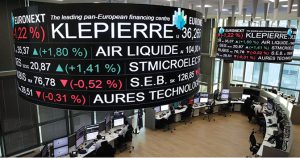Bloomberg
London is no longer home to Europe’s biggest stock market. That prize has been taken by Paris. This week on the In the City podcast, David Merritt speaks to reporter Joe Easton, who has been closely monitoring the race for months. In 2016, before the Brexit vote, British stocks were collectively worth $1.5 trillion more than France. The French stock market is now worth $2.823 trillion, narrowly edging out the UK, which sits at $2.821 trillion.
It’s another sign of Britain’s shrinking place in global finance, and how continental rivals will take up its position. Merritt spoke with reporter Albertina Torsoli, who has covered French companies and markets for 10 years. She explains how Paris has made itself more attractive to foreign investors, the resilience of high-end luxury brands and why she wasn’t surprised to hear the UK stock market is now in second place.
“It’s been a long time in the making. It’s not only the problems the UK faces with Brexit,†she says. “It’s also another five years of President Emmanuel Macron that’s helped give investors’ confidence.†As opposed to the UK’s recent political upheaval, Torsoli says France has seen “a certain form of stability.â€
US Futures Slip
US equity index futures ceded earlier gains and the dollar rose amid mounting concerns about the health of the broader economy and signs that Federal Reserve officials do not see rate hikes pausing any time soon.
S&P 500 futures turned lower after earlier rising about 0.3%. Contracts on the tech-heavy Nasdaq 100 steadied as chipmakers rallied in premarket trading, with Nvidia Corp. up more than 2.5% on forecast-topping quarterly sales. Cisco Systems Inc. jumped 4% on a bullish revenue forecast, lifting rivals Advanced Micro Devices, Inc. and Intel Corp.
The dollar rises against a basket of currencies, while Treasury 10-year yields edged higher amid indications from Federal Reserve officials that policy would tighten further. A closely watched section of the US yield curve remained near levels not seen in four decades — historically, a signal that the world’s biggest economy is on the cusp of recession.
In a scenario that has played out repeatedly across world markets in recent weeks, equities were forced to hit pause on their multi-day rally, as stronger-than-expected US economic data and a raft of Fed speakers dampened hopes the US central bank could end its rate-hiking cycle earlier than expected.
With inflation only starting to ease after hitting decades-high level, and a gauge of US retail sales increasing at the fastest pace in eight months, the message from Fed speakers is that they have further to go to extinguish prices pressures.
San Francisco Fed President Mary Daly said a pause in rate hikes was “off the table,†and New York Fed President John Williams said the central bank should avoid incorporating financial stability risks into its considerations.
Goldman Sachs Group Inc. upped its forecast for peak US interest rates to 5.25% at the top of the range, up from the previous call 5%.
Yet other signs suggest the world’s biggest economy is losing steam as American consumers get squeezed by the highest inflation in four decades. Retailer Target Corp. undershot forecasts Wednesday, saying a pullback from US shoppers had hit earnings.
 The Gulf Time Newspaper One of the finest business newspapers in the UAE brought to you by our professional writers and editors.
The Gulf Time Newspaper One of the finest business newspapers in the UAE brought to you by our professional writers and editors.
